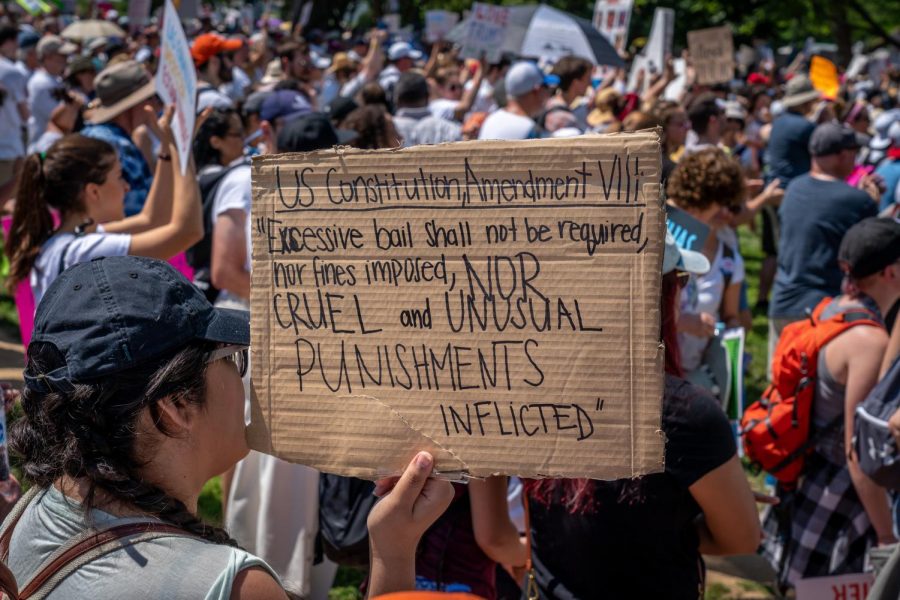Starr: Utah’s Death Penalty Is Too Barbaric To Bring Justice
November 18, 2019
The six people currently on death row in Utah join a total of 2,673 people who face execution in other states and in the U.S. military. While the decline in the death row population continues annually, execution is still a form of punishment in many states. Despite it being unconstitutional, a disservice to victims and their families and extremely costly and barbaric, the United States continues to use capital punishment even though better sentencing options exist.
It can be a decades-long process for capital cases to work their way through the system, which does not serve victims nor their families. It is actively cruel to make those who have already suffered enough deal with an unresolved judgment and multiple appeals. The concept of justice needs to be centered around victims, and lingering cases that trudge through an inefficient system are the exact opposite form of justice and resolution deserved by victims. The extensive and complex process re-traumatizes survivors and victims’ families while also distressing people sitting on juries and those who have to carry out the execution. The idea of closure being achieved through capital punishment is outrageous, and research has shown that life without parole may be a better form of victim-centered justice when considering the physical and psychological well-being of survivors.
The death penalty involves complex legal cases and prolonged timelines, which cost states much more than a sentence of life without parole. Longer trials and years of appeals create excessive sums which could have been avoided with another sentence. A 2012 study done in Utah showed that an extra $1.6 million is spent on death penalty cases than if the sentence had been life without parole. It does not make sense to spend more on a penalty method that does not serve victims well, when other, less traumatizing options exist.
Most states execute individuals through lethal injection, and 16 states apply a secondary method if the drugs aren’t available (shortages frequently occur). Drug companies are not pleased about their products being used for death sentences, and supply dilemmas have arisen out of this as companies have either stopped making certain drugs altogether or have put limits on the purchase of them. Because of this supply issue, secondary forms to execute people are used such as electrocution, hanging and gas. Utah’s secondary method is execution by firing squad, which was last used in 2010 for a 1984 murder case. All of these methods are horrific and it feels almost unbelievable that a firing squad put someone to death in the last ten years within a state so determined to be characterized as pro-life.
These primary and secondary methods of execution should be appalling to the public, and ultimately, sending people to their death is a form of punishment that is both cruel and unusual. These procedures are gruesome and inhumane, and the question around the constitutionality of sending people to their death should further motivate us to prohibit capital punishment altogether. The cruel use of firing squads and injecting drug mixtures to kill people is inconsistent with what makes societies civilized. Most countries around the world have recognized the irreversibility and brutality of capital punishment and have abolished it. As a whole, the United States maintains the unusual practice, but 20 states and Washington D.C. have outlawed capital punishment. They now instead sentence people to life-long prison sentences without the option of parole, and Utah should do the same.
Not only is capital punishment unconstitutional because of the protections granted from the 8th amendment regarding cruelty, but it’s also inconsistent with equal protection of the law specified in the 14th amendment. This violation is blatant considering which populations are more likely to be sentenced to death. This already prejudiced criminal justice system is more likely to arrest, convict and incarcerate people of color more than any other group. Capital punishment sentences unfairly direct brutality to these groups and once more deny people rights promised in the Constitution.
As of April 2019, black defendants make up 41% of the death row inmates in the United States, despite African Americans only being 13% of the total population. Race of the victim also directs sentencing, which makes the application of the death penalty unjust. Analysis has shown that if a victim was white, the death sentence was more likely to be brought forward. So while the homicide rate is significantly higher for black men and women, skin color is directing cruel and unusual punishment to provide “justice” for white people primarily. We should be disgraced with a practice so allied with discrimination.
The list of problems surrounding capital punishment makes its application in 2019 senseless. The Supreme Court has narrowed its usage, but many states still hold the option to send people to their death through sickening means as a way to provide “justice.” Who is served by a drawn-out, expensive and discriminatory practice? Abandoning this archaic system is the best way forward, and Utah should reconsider legislation to eliminate it.











Lorin Rei • Dec 12, 2020 at 7:00 pm
Dudley Sharp you are an idiot , please get over your obession with the death penalty and wanting to kill everyone . You are sick .
dudleysharp • May 19, 2022 at 10:44 am
Lorin:
Try to be a bit more thoughtful. OK?
In three ways, innocents are more protected with the death penalty, than with life without parole (LWOP) (1).
The US executed about 0.2% of her worst murderers, now, after about 20 years of appeals, 1550 executions, 900,000 murders.
That would be executing only 0.2% of US based murderers, as opposed to the nearly 7 billion everyone.
Since 1973:
About 20,000 ADDITIONAL innocents have been murdered by those KNOWN murderers that we have allowed to murder, again – recidivist murderers.
About 500,000 ADDITIONAL innocents have been murdered by those KNOWN criminals that we have allowed to harm, again – recidivist criminals.
About 28,000 additional innocents have been murdered by those KNOWN criminals that we have allowed to harm, again – recidivist criminals.
Possibly, you can figure out who is doing the killing and why and who wants to protect more innocents.
But, likely, you cannot.
1) The Death Penalty: Saving More Innocent Lives
at prodpinnc
Lorin Rei • Dec 12, 2020 at 6:58 pm
For anyone to say the death penalty should remain in Utah should start explaining why some crimes are considered more heinous than others and why the death penalty is used as a bargaining tool from prosecutors. The death penalty has no place in modern society , it’s an unfair and unjust system . When it is applied fairly and for ALL cases involving murder not just for some then and only then can it be considered fair. Utah need to get rid of it’s bloodlust for revenge
dudleysharp • May 19, 2022 at 10:53 am
Lorin:
Easy to explain.
1) Some crimes are considered more heinous than others, because they are, as has been discussed throughout all of known history, as, easily, researched and, generally, well known.
2)About 95% of all criminal cases are plea bargained down to a lesser sanction a) the system would be overwhelmed, otherwise, b) because of the difficulties in many cases, both sides have determined that a plea bargain is the best way to handle the case, for a variety of many factors, so both sides agree to a compromise, very well known and easy to research, c) sometimes the families of the capital murder victims do not want to go through a trial or the irresponsibly long appeals process, both of which are not present in a plea, d) and many more, just takes a tiny bit of research to know this.
It cannot be revenge, if you research and think about it.
Dudley SHarp • Dec 7, 2019 at 12:44 am
How bad is the Utah cost “study’?
Gary Syphus, the fiscal analyst who did the Utah death penalty vs LWOP cost study, stated: “To be clear I did not estimate LWOP costs”
It gets worse from there. full review, here
Problems: Utah Death Penalty Cost Study
http://prodpinnc.blogspot.com/2016/03/death-penalty-costs-utah.html
Dudley Sharp • Dec 7, 2019 at 12:32 am
IS EXECUTION CLOSURE? Of course.
For those who have lost loved ones to murder, the execution of the murderer(s) brings three types of closure.
1) Sparing Innocents. The trauma of losing a loved one to murder is horrific. Survivors do not want anyone else to face that. The closure of execution is that it is the only sanction which guarantees that the murderer cannot murder or, otherwise, harm, again. It is a call for mercy. Living murderers do harm and murder, again. Executed ones do not. Obvious.
Survivors want there to be no chance of more innocents being murdered or otherwise harmed. Execution is the only guarantee.
Those opposing execution are willing to chance more innocents harmed. They are willing not to close that future harm.
2) Justice. The survivors find that execution is the most just sanction and when the execution takes place, justice has been served, a claim confirmed by the jury, which imposed the sanction. Such is the same for all survivors or victims in any cases where the survivors and victims approve of the sanction, whether execution or other.
3) Chapter. All survivors/victims are different and have different paths that they must follow. For many, it is going through various stages, which can be described as chapters in a book, chapters which differ as they go through their lives. The execution/sanction is the closing of the legal chapter.
Emotional/psychological closure
The confusion with “closure” is when some imply that execution can bring psychological or emotional closure to the devastation suffered by the murder victim’s loved ones.
I know of no victim survivor who believes that execution could bring that type of closure. How could it? No punishment can, nor is that the intention or expectation.
No one, other than the clueless, would expect that type of closure.Their loved ones were unjustly murdered, often with torture, and the murderer is justly sanctioned.
The concept of emotional “closure” via execution is, often, a fantasy perpetrated by anti death penalty folks, just so they can denounce it, with a talking point, as in: “Those supporting capital punishment claim that closure is a major reason to support the death penalty – but there is no closure.”
Does anyone believe that rape victims have “all-of-a-sudden” emotional/psychological closure because their rapist is justly sanctioned? Of course not. It’s absurd and lacks all empathy.
All violent crime victims and survivors of those murdered travel different paths in healing with some, tragically, finding none and, others, rising, powerfully, like a phoenix from the ashes and everything in between.
Do any survivors, ever, leave behind all emotional, psychological trauma from such violence? I don’t know but doubt it and think it would be, exceedingly, rare.
Do we think that any sanction would magically, “all-of-a-sudden” erase all emotional, psychological harm from rapes and murders? Of course not.
There is no balancing of the scales, here. There is no comparing the unjust taking of an innocent life by a guilty murderer and the just taking of that murderer’s life.
Some cases.
Murder victim “Mary Bounds’ daughter, Jena Watson, who watched the execution, said Berry’s action deprived the family of a mother, a grandmother and a friend, and that pain will never go away.”
“We feel that we have received justice,” she said Wednesday after the execution. “There’s never an end to the hurt from a violent crime. There can never fully be closure. You have to learn to do the best you can. Tonight brings finality to a lot of emotional issues.”
Ina Prechtl, who lost her daughter Felecia Prechtl. to a rape /murder said, after watching Karl Chamberlain executed: “One question I ask myself every day, why does it take so long for justice to be served?” It took 17 years for the execution (both the above from “Texas executes 1st inmate since injection lull”, 6/11/2008, MICHAEL GRACZYK, Associated Press Writer, HUNTSVILLE, Texas).
======
NOTE: The unjust, cruel delays are, in large part, the fault of irresponsible judges, who should be condemned. Virginia, since 1976, has executed 113 murderers, within 7 years of full appeals, on average. How? Responsible management.
======
Dr. Willam Petit, Jr., whose wife Jennifer, daughters Hayley, 17, and Michaela, 11, suffered through torture, being burned alive and murdered, in a home invasion, stated: “It’s helpful that justice has been served with an appropriate verdict (the death penalty). I don’t think there’s ever closure. I think whoever came up with that concept is an imbecile. . . . many of you know it who have lost a parent or a child or a friend, there’s never closure. There’s a hole… it’s a hole with jagged edges and over time the edges may smooth out a little bit, but the hole in your heart and the hole in your soul is still there. So there’s never closure.” Dr. Petit was nearly beaten to death in the same attack.
“Suffering has no redemptive value”, By SHMULEY BOTEACH The (Bergen) Record, November 18, 2010
======
“(Kidnap/rape/murder victim) Cheryl Payton’s sister, Susan Payton, said, “On this (execution) day, we’re uncertain that you could define today as closure. It is like a chapter in a book that you just read the next chapter and you hope that the next chapter might be better” ( “Victim’s Family Reacts To Execution”, by Steve Alexander, WKRG, Mobile News, Alabama, May 27, 2010).
======
“There may not be closure today. I think there is peace,” said Judge Brendon Sheehan said, after the execution of his father’s murderer. (“Judge Says ‘No Closure’ After Execution of Father’s Killer” By Bill Sheil, Fox 8 I-Team Reporter, Cleveland, Ohio, February 18, 2011)
======
“Right now, it’s a feeling more of relief . . . there’s a little more closure for the whole family. I wanted that closure.” Mary Ann McEntee, mother of Holly Washa, a rape/torture/murder victim, upon hearing of her daughter’s murderer’s execution.
“She said thousands of dollars in tax money was wasted in the past 19 years to house, feed and clothe Brown.”
“Over the next 36 hours, Washa was tortured and raped in a Seattle motel” “Brown was arrested four days later in California, after a brutal rape and knife attack on a 33-year-old woman in a hotel there. That victim lived to call 911.” (“Relief found in killer’s execution”, John Ferak, (Omaha) WORLD-HERALD, September 15, 2010, 6:14 am)
Dudley Sharp • Dec 6, 2019 at 11:48 pm
How odd, you say the death penalty is unconstitutional. Alert the US Supreme Court!
Are you unaware that executions continue and are ongoing?
Of the 114 justices of the US Supreme Court, I believe only two have declared the death penalty unconstitutional, showing how in disrepute that opinion is.
Easy to understand.
Twice, the 5th Amendment authorizes execution.
1) “ No person shall be held to answer for a capital, or otherwise infamous crime, unless on a presentment or indictment of a Grand Jury . . . ” and
(2) “. . . nor shall any person . . . be deprived of life, liberty, or property, without due process of law . . . ”.
The 14th amendment is, equally, clear:
” . . . nor shall any State deprive any person of life, liberty, or property, without due process of law . . .”.
Not surprisingly, over 200 years of US Supreme Court decisions support those amendments and the US Constitution in authorizing and enforcing the death penalty.
Some wrongly believe that the US Supreme Court decision, Furman v Georgia (1972), found the death penalty unconstitutional. It did not.
The decisions found that the statutory enforcement of the death penalty in the US was a violation of the 8th Amendment.
Based upon the death penalty being integral within the constitution, through the 5th and 14th amendments, I do not believe it will ever be found unconstitutional.
Dudley Sharp • Dec 6, 2019 at 11:34 pm
Ms. Starr:
You are, wrongly, blaming the death penalty for long delays.
As we all know, the efficiency of any endeavor, is controlled by management, which in death penalty cases are the judges.
For example, since 1976, Virginia has executed 113 murderers, within 7 years of full appeals, on average.
How? Responsible case management by the judges, which can and should be the case in all jurisdictions.
Allan • Dec 4, 2019 at 12:25 am
Your demographic statistics are flawed. Blacks are 13 percent of the whole country yet death row are mostly in states with high black populations. Alabama is 25 percent black. So death row will have more than 13 percent. The northern states dont have blacks nor the death penalty.
dudleysharp • May 19, 2022 at 10:59 am
Allan:
Neither death row nor prison populations are based upon the general population counts, of any jurisdiction, but upon the rate of criminal activity, by race, ethnicity, gender, age, etc., for example:
This is national:
For the White–Black comparisons, the Black level is 12.7 times greater than the White level for homicide, 15.6 times greater for robbery, 6.7 times greater for rape, and 4.5 times greater for aggravated assault.
For the Hispanic- White comparison, the Hispanic level is 4.0 times greater than the White level for homicide, 3.8 times greater for robbery, 2.8 times greater for rape, and 2.3 times greater for aggravated assault.
For the Hispanic–Black comparison, the Black level is 3.1 times greater than the Hispanic level for homicide, 4.1 times greater for robbery, 2.4 times greater for rape, and 1.9 times greater for aggravated assault.
As the most common capital murders, those which are death penalty eligible, are rape/murders and robbery/murders, the perceived “disparities” (aka expected multiples) will most likely be even greater than the numbers, above, as reason would predict.
From
REASSESSING TRENDS IN BLACK VIOLENT CRIME, 1980.2008: SORTING OUT THE “HISPANIC EFFECT” IN UNIFORM CRIME REPORTS ARRESTS, NATIONAL CRIME VICTIMIZATION SURVEY OFFENDER ESTIMATES, AND U.S. PRISONER COUNTS, See pages 208-209, FN 5, DARRELL STEFFENSMEIER, BEN FELDMEYER, CASEY T. HARRIS, JEFFERY T. ULMER, Criminology, Volume 49, Issue 1, Article first published online: 24 FEB 2011
https://www.academia.edu/8359043/Reassessing_Trends_in_Black_Violent_Crime_1980-2008_Sorting_out_the_Hispanic_Effect_in_UCR_Arrests_NCVS_Offenders_Estimates_and_U.S._Prisoner_Counts